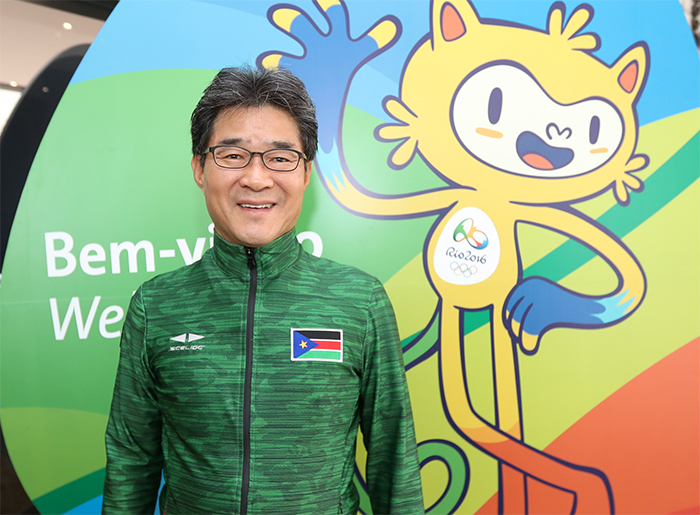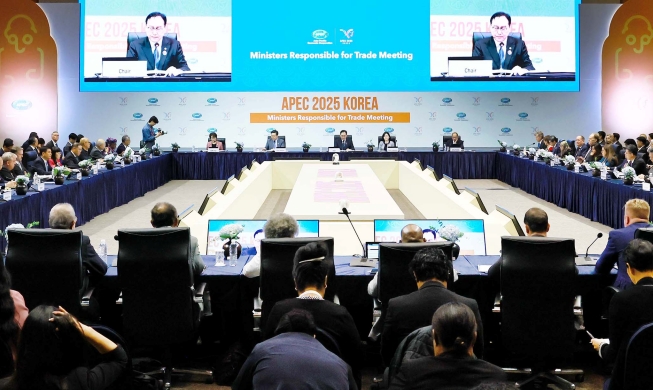View this article in another language
- 한국어
- English
- 日本語
- 中文
- العربية
- Español
- Français
- Deutsch
- Pусский
- Tiếng Việt
- Indonesian
It's a "miracle" for war-torn South Sudan to even be in Rio de Janeiro for the Summer Olympics, says a former South Korean football coach who helped make it happen.
South Sudan became the 206th country to be recognized by the International Olympic Committee (IOC) last August, and will make its Olympic debut here in Brazil this month with three track and field athletes.
And Lim Heung-sae, who coached youth football in South Korea, has been an instrumental figure along the way.
Lim is famous for having once coached South Korean football legend Hong Myung-bo. Lim took his talent to South Africa in 2007, and moved to South Sudan in 2012 to help young athletes in need.
Reached in Rio on Thursday, he said he didn't think he'd make it this far: both literally and figuratively.
"On the day we were scheduled to fly to Rio, a battle broke out in South Sudan's second-largest city," Lim said. "We thought we'd never get out. We managed to leave South Sudan and traveled through Kenya and South Africa before coming here."
In his early days in South Sudan, Lim mostly worked with young football players. Then he turned his focus to helping send the country to the Olympics for the first time.
Under the IOC rules, a nation must have memberships in international federations of at least five sports. When Lim began working in 2014, South Sudan was only a member for football and taekwondo.

Lim said he sought out then South Korean legislator Lee Elisa, a former table tennis star and coach. With assistance from Lee and the Korea Sports Promotion Foundation, Lim said South Sudan came to be recognized by federations for nine sports.
The IOC welcomed the country into the Olympic family, but there was still more work to be done.
The government was hardly in a position to provide necessary financial support for the Olympic delegation. Pressed for money, the South Sudanese delegation was slashed from an initial 40 to under 20, including three athletes.
"The economy in South Sudan is so bad that public servants haven't been paid for six to seven months," Lim said. "Even while we were preparing for the Olympics, I thought about giving it all up."
Despite all the challenges, Lim, now 60, said he will continue to travel in search of countries he can help.
"I've been in Africa for more than 10 years, and I've often felt lonely," he said. "But I will keep finding places where I can be of help."
By Yonhap News
South Sudan became the 206th country to be recognized by the International Olympic Committee (IOC) last August, and will make its Olympic debut here in Brazil this month with three track and field athletes.
And Lim Heung-sae, who coached youth football in South Korea, has been an instrumental figure along the way.
Lim is famous for having once coached South Korean football legend Hong Myung-bo. Lim took his talent to South Africa in 2007, and moved to South Sudan in 2012 to help young athletes in need.
Reached in Rio on Thursday, he said he didn't think he'd make it this far: both literally and figuratively.
"On the day we were scheduled to fly to Rio, a battle broke out in South Sudan's second-largest city," Lim said. "We thought we'd never get out. We managed to leave South Sudan and traveled through Kenya and South Africa before coming here."
In his early days in South Sudan, Lim mostly worked with young football players. Then he turned his focus to helping send the country to the Olympics for the first time.
Under the IOC rules, a nation must have memberships in international federations of at least five sports. When Lim began working in 2014, South Sudan was only a member for football and taekwondo.

Lim Heung-sae, a former South Korean football coach working with the South Sudan Olympic delegation, poses for a picture in Rio de Janeiro on Aug. 4, 2016. (Yonhap)
Lim said he sought out then South Korean legislator Lee Elisa, a former table tennis star and coach. With assistance from Lee and the Korea Sports Promotion Foundation, Lim said South Sudan came to be recognized by federations for nine sports.
The IOC welcomed the country into the Olympic family, but there was still more work to be done.
The government was hardly in a position to provide necessary financial support for the Olympic delegation. Pressed for money, the South Sudanese delegation was slashed from an initial 40 to under 20, including three athletes.
"The economy in South Sudan is so bad that public servants haven't been paid for six to seven months," Lim said. "Even while we were preparing for the Olympics, I thought about giving it all up."
Despite all the challenges, Lim, now 60, said he will continue to travel in search of countries he can help.
"I've been in Africa for more than 10 years, and I've often felt lonely," he said. "But I will keep finding places where I can be of help."
By Yonhap News
